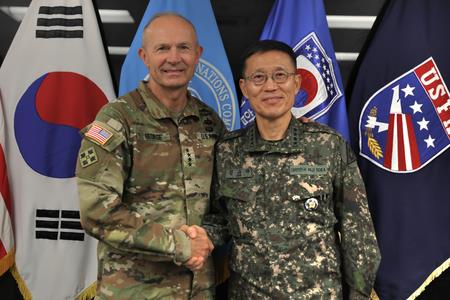
US, South Korean Army Chiefs Discuss Expanding Exchanges Between Troops, Military Drills
Kim held talks with US Army Chief of Staff General George on Monday at Camp Humphreys in Pyeongtaek, some 60 kilometres south of Seoul, according to the armed services, Yonhap News Agency reported.
The two sides concurred on the fact that the Seoul-Washington alliance has evolved as the linchpin of peace and stability on the Korean Peninsula and beyond.
"We will maintain and expand close cooperation with the US Army by revitalising joint training and sharing visions for military innovation to overcome impending challenges and to prepare for the future," Kim said.
Meanwhile, the top diplomats of South Korea, the United States and Japan have reaffirmed their "resolute" commitment to the denuclearisation of North Korea, a joint statement showed on Tuesday, after the North's leader urged Washington to drop that goal as a condition for resuming talks with Pyongyang.
The statement was released after Foreign Minister Cho Hyun, US Secretary of State Marco Rubio and Japanese Foreign Minister Takeshi Iwaya met on the sidelines of the UN General Assembly in New York on Monday for talks on their partnership and other shared issues, including North Korea's nuclear threats.
The statement came a day after North Korean leader Kim Jong-un suggested he is open to engaging in dialogue with US President Donald Trump's administration if Washington drops its denuclearisation demand, saying he has no intention of relinquishing his nuclear stockpiles.
"The Secretary and Foreign Ministers reaffirmed their resolute commitment to the denuclearisation of the Democratic People's Republic of Korea (DPRK) in accordance with relevant United Nations Security Council (UNSC) resolutions, while continuing to make efforts to maintain peace and stability on the Korean Peninsula through dialogue and diplomacy," the statement read, referring to North Korea by its official name.
"They emphasised the need to address together the DPRK's nuclear and missile programs and to maintain and strengthen the sanctions regime against the DPRK by responding firmly and in cooperation with other countries to violations and evasions of the relevant UNSC resolutions."
In the speech during the parliamentary meeting, Kim warned it would be a mistake to think North Korea could be pressured or subdued through sanctions or shows of force.
In Monday's talks in New York, Cho called for "active cooperation" from Washington and Tokyo to resume dialogue with Pyongyang, and "make tangible progress toward peace on the Korean Peninsula and resolution of the nuclear issues," the foreign ministry said in a separate press release.
In the joint statement, the US reaffirmed its extended deterrence commitments to its two Asian allies, which are "critically important" to the security and stability of the Korean Peninsula and broader Indo-Pacific region.
They "reaffirmed their resolve to bolster defence and deterrence by advancing robust security cooperation, including through the regular conduct of the trilateral multidomain exercise 'Freedom Edge,' and to strengthen their respective defence capabilities," the statement said.
The statement included phrasing suggesting a united front against China's assertiveness as they voiced opposition to "unlawful maritime claims in the South China Sea" under constant disputes between Beijing and neighbouring countries, like the Philippines.
Also drawing attention in the statement was the Taiwan Strait, where the three voiced concern over increasingly frequent destabilising actions around Taiwan.
They "encouraged the peaceful resolution of cross-Strait issues and opposed any attempts to unilaterally change the status quo."
They also reiterated serious concerns over North Korea's deepening military cooperation with Russia, including Moscow's support for Pyongyang's military capabilities, particularly its long-range missiles.
They shared concerns over the North's malicious cyber activities using its information technology workers and the need to deepen three-way collaboration on blocking such activities.

Legal Disclaimer:
MENAFN provides the
information “as is” without warranty of any kind. We do not accept
any responsibility or liability for the accuracy, content, images,
videos, licenses, completeness, legality, or reliability of the information
contained in this article. If you have any complaints or copyright
issues related to this article, kindly contact the provider above.


















Comments
No comment